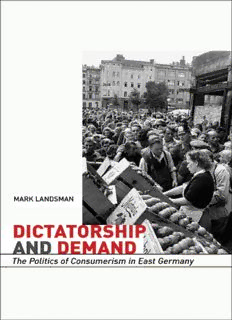
Dictatorship and Demand: The Politics of Consumerism in East Germany (Harvard Historical Studies) PDF
Preview Dictatorship and Demand: The Politics of Consumerism in East Germany (Harvard Historical Studies)
HARVARD HISTORICAL STUDIES • 147 Published under the auspices of the Department of History from the income of the Paul Revere Frothingham Bequest Robert Louis Stroock Fund Henry Warren Torrey Fund MARK LANDSMAN Dictatorship and Demand The Politics of Consumerism in East Germany HARVARD UNIVERSITY PRESS Cambridge, Massachusetts London, England 2005 Copyright © 2005 by the President and Fellows of Harvard College All rights reserved Printed in the United States of America Library of Congress Cataloging-in-Publication Data Landsman, Mark, 1966– Dictatorship and demand:the politics of consumerism in East Germany/Mark Landsman. p. cm.—(Harvard historical studies;147) Includes bibliographical references and index. ISBN 0-674-01698-X (alk. paper) 1. Consumption (Economics)—Germany (East). 2. Socialism—Germany (East). 3. Germany (East)—Economic conditions. 4. Germany (East)—Politics and government. I. Title. II. Series. HC290.795.C6L36 2005 2004054334 To Jenny Contents Acknowledgments ix Abbreviations xi Introduction 1 1 Production and Consumption: Establishing Priorities 16 2 The Contest Begins: The Currency Reform, the Berlin Blockade,and the Introduction of the HO 38 3 The Planned and the Unplanned: Consumer Supply and Provisioning Crisis 74 4 The Rise, Decline, and Afterlife of the New Course 115 5 Demand Research and the Relations between Trade and Industry 149 6 Crisis Revisited: The Main Economic Task and the Building of the Berlin Wall 173 Epilogue 208 Notes 223 Index 289 Acknowledgments In the course of writing this book, I have incurred many debts of grati- tude. It is a great pleasure to acknowledge them here. To begin with— the money. I would like to thank Columbia University for a President’s Fellowship in 1996–97, which enabled me to get started on the re- search. Most of the research, however, was funded by the Social Sci- ence Research Council’s Berlin Program for Advanced German and European Studies in 1997–98. The Berlin Program was a unique ex- perience, offering a stimulating intellectual environment and oppor- tunities for making contacts at Berlin’s Freie Universität, the Zentrum für Zeithistorische Forschung in Potsdam, and the Berlin branch of the Munich Institut für Zeitgeschichte. For their scholarly rigor and comradery, I would like to thank my fellow Berlin fellows; for their indispensable administrative assistance, I am indebted to Ingeborg Mehser and Dagmar Klenke. I would also like to thank Professor Peter Steinbach for allowing me to present some of my early findings to his seminar on East Germany at the Freie Universität. Anyone who has done archival research knows how difficult the expe- rience can be. Without the help of patient archivists the task would be impossible. I am deeply grateful to the staffs of the Bundesarchiv in Lichterfelde, the Landesarchiv Berlin (Breite Straße), and the Bundes- archiv Außenstelle in Dahlwitz-Hoppegarten. While in Berlin, I also benefited from countless discussions with several scholars—German and American, professors and doctoral candidates. For their advice, sugges- tions, and criticisms, I would like to thank Richard Bessel, Dierk Hoff- mann, Patrice Poutrus, Judd Stitziel, Corey Ross, Paul Steege, and Peter
Description: